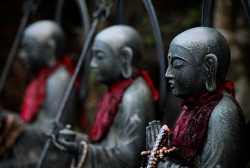Bhikshu
Click here to see other articles relating to word Bhikshu
bhikshu
比丘 (Skt; Pali bhikkhu; Jpn biku ) bhikshu (bhikkhu): Male follower of the Buddha (monk) who has left “home” and keeps the full 250 vows
Bhikshu (dge slong). A practitioner who has renounced worldly life and taken the pledge to observe the 253 precepts of a fully ordained monk in order to attain liberation from samsara.
A Buddhist monk. In the strict sense, a fully ordained monk who has renounced the secular world and observes the entire set of commandments, or two hundred and fifty precepts according to The Fourfold Rules of Discipline, set forth for monks.
The term bhikshu means one who begs, particularly for alms, and generally one who devotes oneself to Buddhist practice and subsists entirely on alms received from laypersons through the practice of alms-begging.
A nun is called bhikshuni. With the development of the community of monks and the establishment of a system of monastic rules, bhikshu came to refer to only those men who had gained admission into the Buddhist Order by going through an established ordination ceremony. They were permitted to own only three robes, all made of cast-off rags, and one begging bowl.
Thus equipped, they carried out their practice of religious mendicancy. Monks still in their teenage years were not recognized as bhikshu.
In the early period of Buddhism, bhikshus lived alone in forests and other quiet locations, devoting themselves to meditation and other practices. Later they gathered with other Buddhists to form a community. See also two hundred and fifty precepts.
